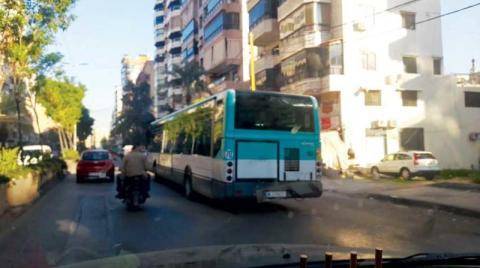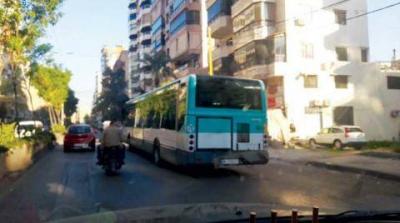Only 10 out of 50 buses donated by the French government to Lebanon have started operations as of yesterday, within the Greater Beirut area and its suburbs. A shortage of funds and drivers has hindered the deployment of additional buses, while the cost of private taxi rides has reached unprecedented levels, burdening employees who lack cars and are forced to spend a significant portion of their salaries on transportation. The launch of these buses was delayed until maintenance was completed, as they were used and required repairs in addition to various administrative tasks.
Public transport accounts for only 5% of the market in Lebanon. The number of cars on the roads is exceedingly high, especially as they typically transport no more than two people. However, the absence of public transport pushes most Lebanese to acquire cars and drive themselves. Following the financial crisis in 2019, the collapse of the Lebanese pound, and the price of gasoline exceeding 750,000 Lebanese pounds (around 17 US dollars), many were forced to seek alternative means of transport, such as motorcycles.
The Ministry of Public Works and Transport is working in collaboration and coordination with the Railway and Public Transport Authority on a new approach for the sector, where the state acts as the regulator and the private sector operates the 95 buses owned by Lebanon. Minister of Public Works and Transport Ali Hamieh states that the number of employees in the Railway and Public Transport Authority is 2,808, while currently, only 28 drivers are available at the authority, which is why a decision was made to operate the buses solely within Greater Beirut and Mount Lebanon. The fare has been set at 20,000 pounds per person (less than half a dollar).
Ministry sources emphasize the necessity of securing the required allocations to operate these buses in 2023, after funding for the last month of the current year has been secured. They noted in a statement to “Asharq Al-Awsat” that the ministry, which was previously the highest spender with the least revenue, has now become the ministry generating the most income for the treasury; however, it must also be provided with support to continue its operations.
Ziad Nasr, the head of the Railway and Public Transport Authority, points out that "the operation of the 10 buses is within the financial and human resources available to the ministry and the authority," noting that the continuity of their operation will be threatened if necessary funds for maintenance and fuel are not secured. He states that “the government’s approval to contract with the private sector to operate these buses under a clear contract, while adhering to public procurement laws, could serve as a facilitating factor since this sector has the flexibility for immediate procurement.” Nasr expressed hope that workers in this sector would step forward to participate in this mission, given that there was a noticeable lack of enthusiasm when tenders for maintenance, fuel, and drivers were issued during the summer, attributing the hesitation to the instability of the exchange rate and the demand for pricing in dollars, which cannot be fulfilled.
For his part, the chairman of the General Labor Union, Bashar Asmar, clarified that "the current operation of the buses is experimental," emphasizing that "their launch required time for maintenance and securing drivers." Asmar stressed in a statement to “Asharq Al-Awsat” the importance of this step amid the exorbitant prices that make it difficult for many to travel, explaining that "the fare for a taxi ride within Beirut, for instance, ranges between 50,000 and 70,000 Lebanese pounds (between one and one-and-a-half dollars), and there is no possibility of stabilizing these fares, which should be managed by the Ministry of Transport in coordination with transport unions due to the instability of the exchange rate (of the pound) and the continually rising price of gasoline."
The road transport sector has been dealt a heavy blow with the government's decision to redirect a World Bank loan of $295 million meant for developing public transport to cover expenses related to securing essential materials amid the depletion of the Central Bank of Lebanon's reserves. This loan was supposed to cover costs for a public transport project in Greater Beirut aimed at launching the country's first modern public transportation network in decades and alleviating the severe traffic congestion on Lebanese roads.
Every day, 400,000 vehicles enter the capital Beirut from surrounding and distant areas. The number of vehicles in Lebanon has increased unprecedentedly over the past 20 years, currently totaling 1.5 million vehicles. Lebanon has 403 kilometers designated for railways that are never utilized. Previously, there were three operational lines: the Naqoura - Beirut - Tripoli line extending toward Homs in Syria, the Beirut - Damascus line, and the Riyaq - Homs line. Today, the railway infrastructure is non-operational, with significant encroachments on large portions of its right-of-way.
The Railway and Public Transport Authority has prepared a "comprehensive project" to rehabilitate these railways and the Beirut - Tripoli and Tripoli - Aboudiyeh (Syrian border) lines, with a study conducted in cooperation with the European Union needing approximately $2.5 billion in necessary funding.




